Businesses invest a lot of time and money figuring out how to execute more efficiently with fewer people, discovering how new machines, methods, and processes can help them lower costs or improve their service, yet most don’t recognize any additional service or upgrade for the customer increases the cost in providing it.
We’re busy trying to be better at everything ignoring The Four Service Truth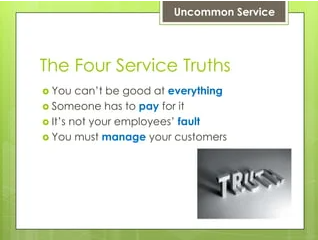 (Uncommon Service: How to Win by Putting Customers at the Core of Your Business).
(Uncommon Service: How to Win by Putting Customers at the Core of Your Business).
Verne Harnish labeled Uncommon Service the best book ever written on strategy. It does not disappoint!
How to Fund Greatness
Here are four options to fund great service:
- Charge customers extra for it—in a palatable way. As we shared in You Can’t Be Good at Everything – Truth #1 to Deliver Uncommon Service, Commerce Bank’s funding source for additional hours was not to charge customers outright for better service.
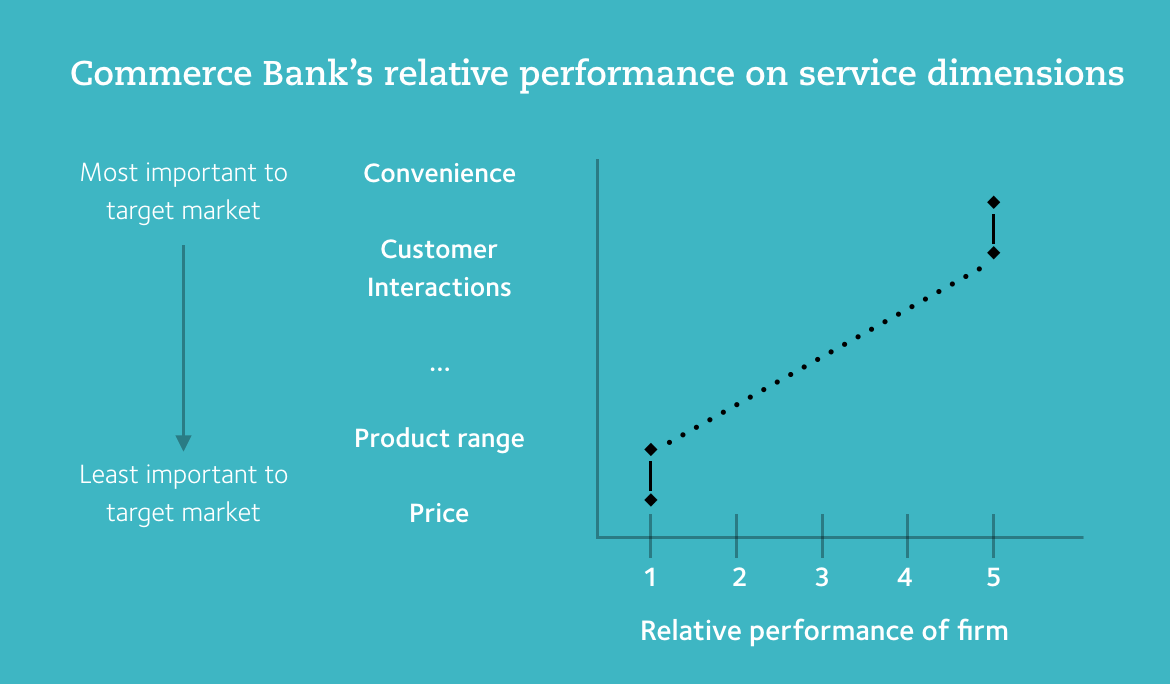 Commerce offered an interest rate on deposits half a percentage point lower than the rate the competition was paying. Customers paid for these convenient hours each day whether they used the bank or not.
Commerce offered an interest rate on deposits half a percentage point lower than the rate the competition was paying. Customers paid for these convenient hours each day whether they used the bank or not. - Make cost reductions that also improve service. Uncommon Service provides the example of Progressive Insurance. They invest more on service than other insurance companies but don’t charge their customers for it. They provide immediate-response vans to assist customers in distress. The insurance industry is ripe with fraud. Progressive shows up at the scene of the accident
 observing firsthand what happened. They refer to these vans internally as fraud busters. “Fraud, disputed claims and legal fees represent $15 out of every $100 in insurance premiums across the industry. But when a claims adjuster shows up within minutes with a sharp eye and an open heart, both fraud and legal costs tumble. By drastically lowering these operating costs, Progressive’s excellence more than pays for itself.”
observing firsthand what happened. They refer to these vans internally as fraud busters. “Fraud, disputed claims and legal fees represent $15 out of every $100 in insurance premiums across the industry. But when a claims adjuster shows up within minutes with a sharp eye and an open heart, both fraud and legal costs tumble. By drastically lowering these operating costs, Progressive’s excellence more than pays for itself.” - Make service improvements that also reduce costs. A great example from Scott Cook founder of Intuit, Verne Harnish shared with us. Cook increased the cost and quality of the customer service he was delivering to reduce the unpaid demand for it. To Cook, providing outstanding phone support to users of his small-business software—the bane of most call centers—could be a useful source of input for continued product development and ultimately a cost-reduction strategy. Intuit asked its product development team to suit up with headsets and field calls.
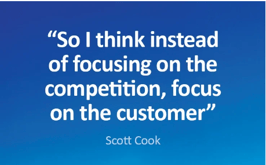 When Intuit customers called up for live software support, they were likely to get someone who understood the product’s functionality better than anyone else on the planet, an engineer who had been charged with product improvement and who may have played a role in designing the software. Cook’s logic was this—what better way to gain firsthand knowledge of where users are stumbling? This was information that could be used to make subsequent versions of Intuit products more intuitive—and reduce the need for customers to pick up the phone in the first place. “Our competitors think we’re crazy,” Cook told some HBS colleagues, “but if we got as many calls as they did, we’d be out of business.” The investment has paid off in better software, which means lower call volume, which allows for better service and lower tech support costs down the road.
When Intuit customers called up for live software support, they were likely to get someone who understood the product’s functionality better than anyone else on the planet, an engineer who had been charged with product improvement and who may have played a role in designing the software. Cook’s logic was this—what better way to gain firsthand knowledge of where users are stumbling? This was information that could be used to make subsequent versions of Intuit products more intuitive—and reduce the need for customers to pick up the phone in the first place. “Our competitors think we’re crazy,” Cook told some HBS colleagues, “but if we got as many calls as they did, we’d be out of business.” The investment has paid off in better software, which means lower call volume, which allows for better service and lower tech support costs down the road. - Get customers to do the work for you. The funding service with the longest and most uncertain pedigree is getting your customers to work for free, rather than paying employees. Piggly Wiggly in 1916 started this trend in grocery stores. You’re not old enough to remember this, nor are you able to remember when attendants pumped your gas. The question to answer is, are you making your customers better off along the way?
Method 1 is the simplest, at least from a design perspective. Methods 2 and 3 are the most reliable. Method 4 gets the most attention.
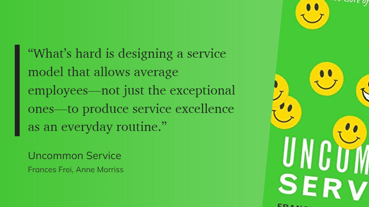 Extra service fees aren’t inherently good or bad. Their success depends on the specific contract you have with customers.
Extra service fees aren’t inherently good or bad. Their success depends on the specific contract you have with customers.
A loyalty program is one way to get paid for a premium service experience. True loyalty programs—programs that increase customers’ willingness to pay a premium price—are rare, largely because most loyalty programs are mislabeled retention programs.
For self-service to be part of an uncommon service experience, customers must prefer self-service to a full-service alternative.
Next week we continue our Strategy journey through Uncommon Service: How to Win by Putting Customers at the Core of Your Business Four Truths with Truth #3 It’s Not Your Employees’ Fault
Growth demands Strategic Discipline.
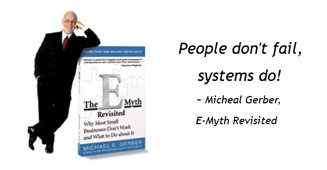 My business customers often complain, “My employees are worthless, stupid, incompetent, etc.!” Truth #3 from Uncommon Service: How to Win by Putting Customers at the Core of Your Business dispels this management excuse. Michael Geber in the E-Myth Revisited shared, “You can’t manage people. People are unmanageable. You can only manage a system.” If you’re consistently blaming your team for customer service mistakes, you’ll want to make sure to read our next blog.
My business customers often complain, “My employees are worthless, stupid, incompetent, etc.!” Truth #3 from Uncommon Service: How to Win by Putting Customers at the Core of Your Business dispels this management excuse. Michael Geber in the E-Myth Revisited shared, “You can’t manage people. People are unmanageable. You can only manage a system.” If you’re consistently blaming your team for customer service mistakes, you’ll want to make sure to read our next blog.
Building an enduring great organization requires disciplined people, disciplined thought, disciplined action, superior results, producing a distinctive impact on the world.
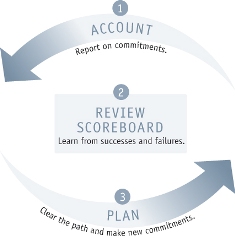 Discipline sustains momentum, over a long period of time, laying the foundations for lasting endurance.
Discipline sustains momentum, over a long period of time, laying the foundations for lasting endurance.
A winning habit starts with 3 Strategic Disciplines: Priority, Metrics, and Meeting Rhythms. Forecasting, accountability, individual, and team performance improve dramatically.
Meeting Rhythms achieve a disciplined focus on performance metrics to drive growth.
Let Positioning Systems help your business achieve these outcomes on the Four most Important Decisions your business faces:
|
DECISION |
RESULT/OUTCOME |
|
PEOPLE |
|
|
STRATEGY |
|
|
EXECUTION |
|
|
CASH |
|
Positioning Systems helps mid-sized ($5M - $500M+) businesses Scale-UP. We align your business to focus on Your One Thing! Contact dwick@positioningsystems.com to Scale Up your business! Take our Four Decisions Needs Assessment to discover how your business measures against other Scaled Up companies. We’ll contact you.
NEXT BLOG – It’s Not Your Employees’ Fault - Uncommon Service Truth # 3






.jpeg?width=150&height=135&name=Hand%20with%20marker%20writing%20the%20question%20Whats%20Next_%20(1).jpeg)

